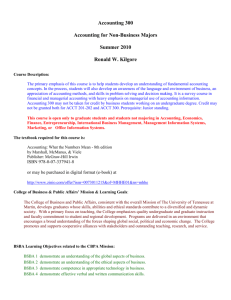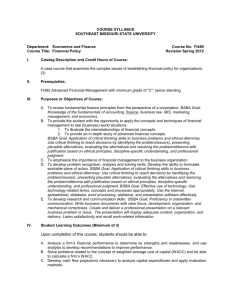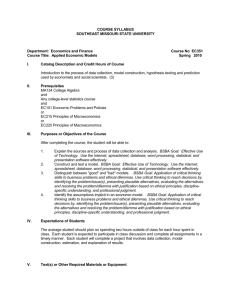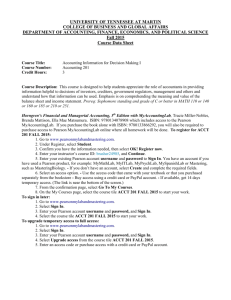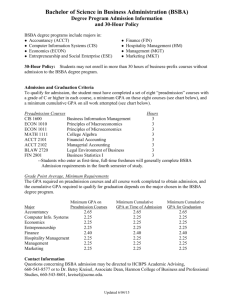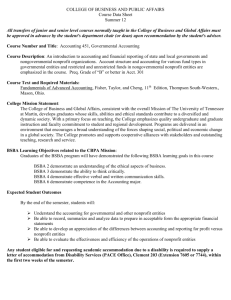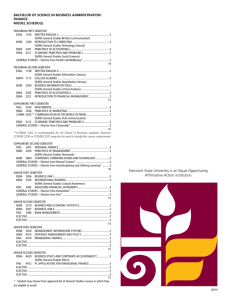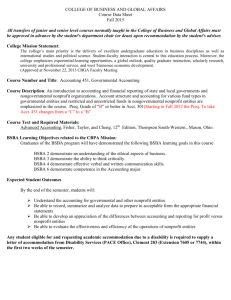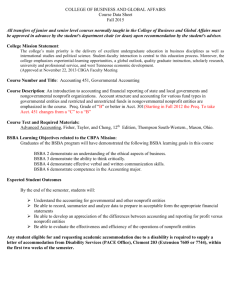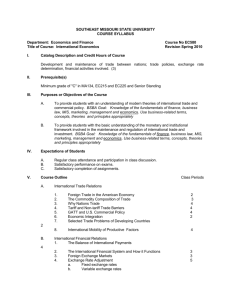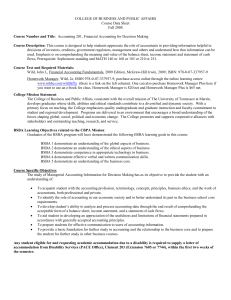202summer10 - The University of Tennessee at Martin
advertisement
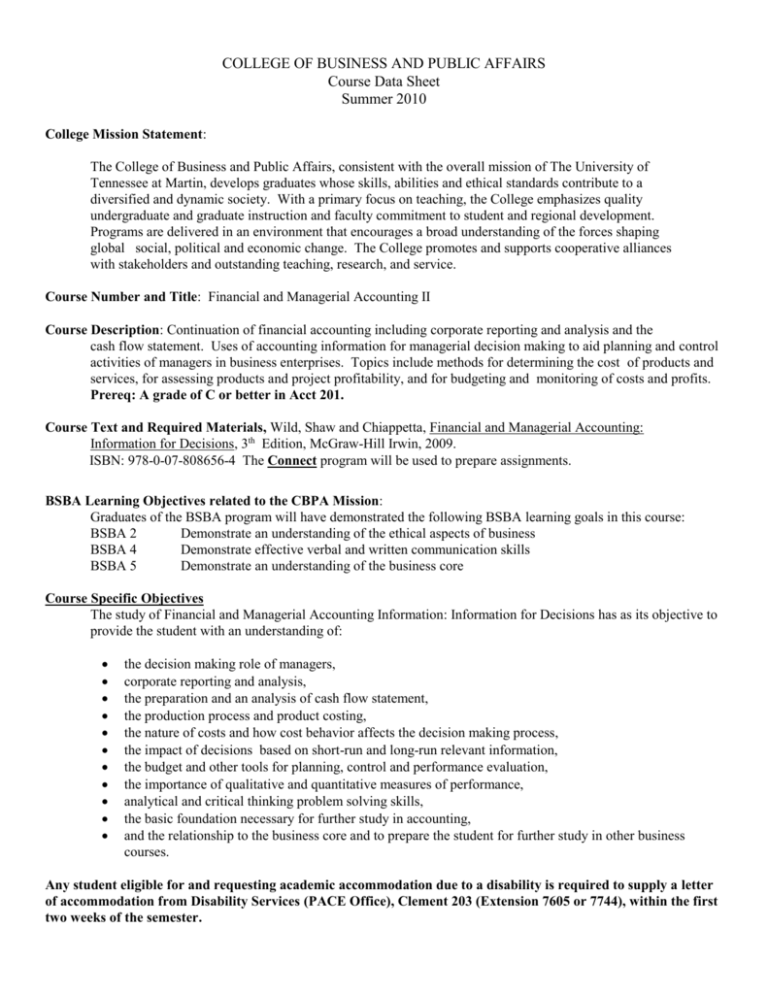
COLLEGE OF BUSINESS AND PUBLIC AFFAIRS
Course Data Sheet
Summer 2010
College Mission Statement:
The College of Business and Public Affairs, consistent with the overall mission of The University of
Tennessee at Martin, develops graduates whose skills, abilities and ethical standards contribute to a
diversified and dynamic society. With a primary focus on teaching, the College emphasizes quality
undergraduate and graduate instruction and faculty commitment to student and regional development.
Programs are delivered in an environment that encourages a broad understanding of the forces shaping
global social, political and economic change. The College promotes and supports cooperative alliances
with stakeholders and outstanding teaching, research, and service.
Course Number and Title: Financial and Managerial Accounting II
Course Description: Continuation of financial accounting including corporate reporting and analysis and the
cash flow statement. Uses of accounting information for managerial decision making to aid planning and control
activities of managers in business enterprises. Topics include methods for determining the cost of products and
services, for assessing products and project profitability, and for budgeting and monitoring of costs and profits.
Prereq: A grade of C or better in Acct 201.
Course Text and Required Materials, Wild, Shaw and Chiappetta, Financial and Managerial Accounting:
Information for Decisions, 3th Edition, McGraw-Hill Irwin, 2009.
ISBN: 978-0-07-808656-4 The Connect program will be used to prepare assignments.
BSBA Learning Objectives related to the CBPA Mission:
Graduates of the BSBA program will have demonstrated the following BSBA learning goals in this course:
BSBA 2
Demonstrate an understanding of the ethical aspects of business
BSBA 4
Demonstrate effective verbal and written communication skills
BSBA 5
Demonstrate an understanding of the business core
Course Specific Objectives
The study of Financial and Managerial Accounting Information: Information for Decisions has as its objective to
provide the student with an understanding of:
the decision making role of managers,
corporate reporting and analysis,
the preparation and an analysis of cash flow statement,
the production process and product costing,
the nature of costs and how cost behavior affects the decision making process,
the impact of decisions based on short-run and long-run relevant information,
the budget and other tools for planning, control and performance evaluation,
the importance of qualitative and quantitative measures of performance,
analytical and critical thinking problem solving skills,
the basic foundation necessary for further study in accounting,
and the relationship to the business core and to prepare the student for further study in other business
courses.
Any student eligible for and requesting academic accommodation due to a disability is required to supply a letter
of accommodation from Disability Services (PACE Office), Clement 203 (Extension 7605 or 7744), within the first
two weeks of the semester.
COLLEGE OF BUSINESS AND PUBLIC AFFAIRS
Class Data Sheet
Accounting 202
Instructor:
Dr. Ronald W. Kilgore
Office:
CBGA 138
Office Hours: MTWR: 11:00 A.M. – 12:00 P.M.
1:00 P.M. – 2:00 P.M
And by Appointment
Semester:
Phone:
Fax:
Email:
Spring 2010
731 881 7240
731-881-7241
rkilgore@utm.edu
COURSE REQUIREMENTS:
Attendance Policy
You are strongly encouraged to not miss classes. One (1) point will be deducted from your total grade
points for each missed class after the first three misses. You are expected to be in class and seated on
time.
Test Policy
EXAM
1
2
3
HOMEWORK
MASS FINAL
DATE and CHAPTERS
TIME
SEE CLASS SCHEDULE
SEE CLASS SCHEDULE
SEE CLASS SCHEDULE
WEIGHT
100 POINTS
100 POINTS
100 POINTS
50 POINTS
100 POINTS
Assignment Policy
(1) Students are responsible for reading each chapter and preparing assignments from the text. All
assignments are due on the date specified by the course instructor. (2.) Students are expected to attend
class on a regular basis and participate in class discussion. They are encouraged to not miss scheduled
tests unless seriously ill or for an unavoidable emergency. Make-up tests will be given only for
justifiable reasons.
Grades: (unless modified by a curve):
A:
B:
C:
D:
F:
90.0-100% of total possible points
80.0-89.9% “
“
“ “
70.0-79.9% “
“
“ “
60.0-69.9% “
“
“ “
Below 60%
“ “
“ “
(405 – 450)
(360 – 404)
(315 – 359)
(270 – 314)
(269 and below)
Classroom Courtesy
Students are expected to conduct themselves in a professional manner in class. Nonprofessional
behavior or language will result in the student being dropped from the course. Cell Phones: All cell
phones should be turned off during class. No cell phones will be allowed as calculators during tests or
exams.
Academic Integrity
Students are expected to conduct themselves at a high level of academic integrity. Any student found
cheating will be assigned a final grade of F for the course and will be reported to the Vice Chancellor for
Student Affairs and the dean of his/her college for further disciplinary action.
To sin by silence when they should protest makes cowards of men." (Abraham Lincoln).
"Aggies do not lie, cheat or steal, nor do they tolerate those who do." (Aggie Code of Honor)
“Honor is better than honors." (President Abraham Lincoln).
Day
July 13
July 14
July 15
July 16
July 19
July 20
July 21
July 22
July 23
July 26
July 27
July 28
July 29
July 30
August 2
August 3
August 4
August 5
August 6
August 9
August 10
August 11
August 12
August 13
Topic Covered
Corporate reporting and
analysis
Continued
Reporting and analyzing
cash flows
Continued
Managerial accounting
concepts and principles
Continued
Reading
Assignments
Class
Problems
{B Only}
Chapter 11
Homework
Exercises
Relationship
to BSBA Goals
Ethics Challenge
BTN-3
P1,P2,P3,P4
BSBA 2,4,5
P1,P2,P3,P4,P5
BSBA 5
P2,P3,P4,P6,P8
BSBA 2, 4, 5
P1,P3,P4,P5
BSBA 5
Chapter 12
Chapter 14
TEST ONE
Job order costing and
analysis
Activity based costing and
analysis
Continued
Cost behavior and costvolume-profit
Continued
Chapter 15
Chapter 17
Ethics Challenge
BTN-3
P1,P2,P3,P4
BSBA 2,4,5
P1,P2,P3,P4
BSBA 5
Chapter 18
TEST TWO
Variable costing and
performance reporting
Continued
Chapter 19
Master budgets and performance
planning
Continued
Flexible budgets and
performance planning
Continued
Chapter 20
P1,P2,P4,P5
BSBA 5
Ethics Challenge
BTN-3
P1,P2, P3, P4, P6
Chapter 21
BSBA 2, 4, 5
Ethics Challenge
BTN-3
P1,P3,P4,P5,P6
BSBA 2, 4, 5
P1,P2,P4,P5
BSBA 5
P1,P3,P4,P6
BSBA 5
TEST THREE
Decentralization and
performance evaluation
Relevant costing for
managerial decisions
Continued
FINAL EXAM
Chapter 22
Chapter 23
My WebPage:
http://www.utm.edu/~rkilgore/NewWPage/beta.html
Homework Instructions:
Connect lists those problems that should be completed on Connect to earn the fifty points. These problems do not need
to be turned in for grading. They will be graded by Connect. This does not include the “ETHICS CHALLENGE”
problems which must be turned in for grading and will count as bonus points. The “ETHICS CHALLENGE” problems
must be turned in as each chapter is completed. They should be completed in WORD. Connect homework assignments
are required to be completed 24 Hours after the current test. Your ability to work problems on Connect will be
turned off at the end of the 24 Hour period. Connect will allow you multiple attempts to work the problems. It is the
student’s responsibility to contact my office concerning any discrepancies. Do not wait until the end of the semester to
reconcile any differences. The burden of proof concerning completed homework assignments falls upon the student. Do
not throw away any homework “ETHICS CHALLENGE” until you are sure it has been graded and properly recorded.
